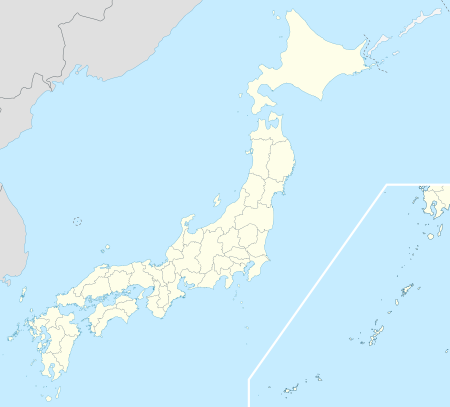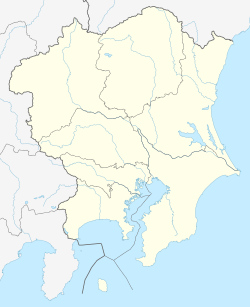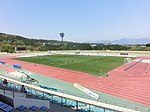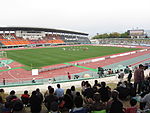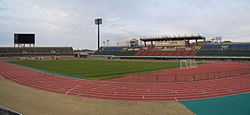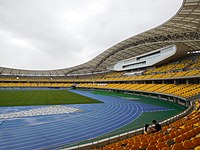J3 League
 | |
| Organising body | J.League |
|---|---|
| Founded | 2013 |
| Country | Japan |
| Confederation | AFC |
| Number of clubs | 20 |
| Level on pyramid | 3 |
| Promotion to | J2 League |
| Relegation to | Japan Football League |
| Domestic cup(s) | Emperor's Cup |
| League cup(s) | J.League Cup |
| Current champions | Omiya Ardija (1st title) (2024) |
| Most championships | Blaublitz Akita (2 titles) |
| TV partners | DAZN |
| Website | Official website (in English) |
| Current: 2025 J3 League | |
J3 League (Japanese: J3リーグ, Hepburn: J3 Rīgu) or simply J3 is the third division of Japan Professional Football League (日本プロサッカーリーグ, Nihon Puro Sakkā Rīgu). It was established in 2013 as the third-tier professional association football league in Japan under the organization of J.League. The league is known as the Meiji Yasuda J3 League (Japanese: 明治安田J3リーグ) for sponsorship reasons.[2]
The third-tier nationwide league is a relatively recent development in Japanese football with a first attempt made in 1992 (second division of the old JFL), though it only lasted for two seasons. In 1999, following the establishment of J2 League, a new Japan Football League was created to comprise the third tier and lower divisions. After the introduction of J3, the JFL was demoted to the fourth-tier nationwide league, for the first time in history of Japanese football.
History of Japanese third-tier football
[edit]Amateur era (until 2013)
[edit]A national third tier of Japanese association football was first established along with its professionalization in 1992, when the newly created Japan Football League kicked off with two tiers below the professional J. League. Among the 10 original clubs of the third tier included the forerunners to Kyoto Sanga FC, Ventforet Kofu, Omiya Ardija, Avispa Fukuoka and Vissel Kobe (the latter two being located in different regions from their J. League successors). But after a number of clubs were lost for various reasons – some were promoted to J.League and the others folded – the league contracted the second division in 1994 and continued with the single second-tier division.
The third tier football was reintroduced in 1999 upon creation of fully professional J2. The old JFL was dissolved but a new Japan Football League was formed the same year in order to establish a nationwide top-tier amateur league. But despite its officially amateur status the league quickly became de facto semi-professional, serving as the cradle of the future J. League members. Since the establishment of associate membership system in 2006 the number of professional clubs holding or actively seeking for this status has grown steadily and reached its peak in 2013 season when 6 full members and 2 former candidates made up to almost half of the league's 18 teams. Through the course of the season this number grew even bigger, to 10 full associate members that formed the core of J3.
Professionalization and establishment (2013)
[edit]Close to the end of 2012 football season Japanese media began to spread rumors[3][4] about the upcoming professional third-tier league, referred to as either "J3" or "J.Challenge League". Most of the sources agreed that the new league would feature around 10–12 clubs, most of which became associate members. The league would also provide more relaxed licensing criteria in comparison to J2 – e.g. the stadium seating capacity of just 3,000 with no mandatory floodlighting.[5]
After the discussion on J1-J2 Joint Committee on 16 January 2013, all J.League clubs agreed in principle with an establishment of the new league starting 2014.[6] This decision was formally put into force by J.League Council in a 26 February executive meeting.[7] The league was planned to launch with 10 teams, but another session of J.League Council in July decided that inaugural season of J3 would feature 12 teams.[8]
To participate, a club must have held an associate membership, or have submitted an application before 30 June 2013, and then passed an inspection to obtain a participation licence issued by J.League Council.[9] On 19 November, J.League confirmed the following clubs to participate in the inaugural J3 season:[10]
- Gainare Tottori (relegated from 2013 J.League Division 2)
- Blaublitz Akita (JFL)
- Machida Zelvia (JFL)
- SC Sagamihara (JFL)
- Nagano Parceiro (JFL)
- Zweigen Kanazawa (JFL)
- YSCC Yokohama (JFL)
- FC Ryukyu (JFL)
- Fukushima United (JFL)
- Fujieda MYFC (JFL)
- Grulla Morioka (Tōhoku League, 2013 Tōhoku League Champion and Regional Promotion Series Champion)
- J.League U-22 team, composed of the best J1 and J2 youngsters to prepare them for the 2016 Olympics[11]
Future plans
[edit]The league has not provided a clear expansion timeline yet but it was most likely that J3 continued to accommodate new teams after its inaugural season. The following is a list of clubs that may get promoted to J.League in the near future:[12]
- Cobaltore Onagawa (Tohoku Soccer League) – J.League 100 Year Plan club status
- Criacao Shinjuku (JFL) – J3 license and J.League 100 Year Plan club status
- Nankatsu SC (KSL Division 1) – J.League 100 Year Plan club status
- Reilac Shiga FC (formerly MIO Biwako Shiga; JFL) – J3 license holders
- ReinMeer Aomori (JFL) – J3 license holders
- Tokyo 23 FC (KSL Division 1) – J.League 100 Year Plan club status
- Veertien Mie (JFL) – J3 license holders
- Verspah Oita (JFL) – J3 license holders
- Vonds Ichihara (KSL Division 1) – J.League 100 Year Plan club status
Other teams have applied for the 100 Year plan status or a J3 license but were denied. Most of these clubs continue to aim for J3 as their ultimate goal.
- None
Four teams, one withdrew its J3 license, two their 100 Year Plan status, formerly associate membership, and another was deprived of both:
- Okinawa SV (JFL)
- Atletico Suzuka Club (JFL)
- Tokyo Musashino City FC (JFL)
- Tonan Maebashi (KSL Division 1)
Some sources claimed that J3 was intended to reach up to 60 clubs in the future, being split into three regionalized divisions running in parallel.[13]
At the end of January 2023, the J.League removed its 100 Year Plan status from application requirements for J3 licenses as part of revisions to the division's club licensing regulations.[14] In December, the J.League voted to adopt a fall–spring format, beginning in 2026–27. The regular season will begin in August and pause for a winter break between December and February, with the final matches played in May.[15]
Timetable
[edit]| Year | Important events | No. J3 clubs |
Prom. slots |
Rel. slots |
|---|---|---|---|---|
| 2014 |
|
11+1 | 1.5 | 0 |
| 2015 |
|
12+1 | ||
| 2016 |
|
13+3 | ||
| 2017 |
|
14+3 | 2 | |
| 2018 |
|
15+3 | ||
| 2019 |
|
16+3 | ||
| 2020 |
|
16+2 | ||
| 2021 |
|
15 | ||
| 2022 | 18 | |||
| 2023 |
|
20 | 0–2 | |
| 2024 |
|
3 | ||
| 2025 |
Crest
[edit]On 20 December 2022, the J3 League logo colour was changed to blue for the 2023 season prior to the 10th anniversary of Japan's third-tier professional league below J1 and J2, whose respective logo colours are red and green.[16]
History crest
[edit]-
First logo (2014)
-
Second logo (2015–2018)
-
Third logo (2019–2022)
2025 season
[edit]League format
[edit]For this season, the league is played in two rounds (home and away), each team playing a total of 38 matches.[17]
Each team must have at least 3 players holding professional contracts. Also, since the 2016 season, 5 foreign players are allowed per team, plus 1 more from J.League's ASEAN partner country of or from other AFC countries. The matchday roster consists of 18 players, and up to 3 substitutes are allowed in a game.[18]
Promotion and relegation
[edit]Rules for promotion to J2 are largely similar to those of Japan Football League in recent seasons: to be promoted, a club must hold or be granted a J2 license and finish in top 2 of the league. From 2017 to 2023, the champions and the runners-up have been promoted directly and replace the 21st- and 22nd-placed J2 clubs. If only the champion or runner-up holds or is given a J2 license, only the bottom club of J2 is relegated; if both top 2 finishers are ineligible for promotion, then no teams are promoted to or relegated from J2.[17]
Since the 2024 season, the 3rd to 6th placers have promotion playoffs and the winner is also the third team automatically promoted. The three J2 bottom-placed teams are automatically relegated to J3.[19]
At a J.League board meeting in August 2021, 60 clubs (of which 20 are J3) were targeted for the entire league, and a possibility that J3 would have exceeded 20 clubs by the 2023 season was brought up. Mitsuru Murai, the J.League chairman, revealed that he was discussing how to adjust to 20 clubs. At this time, he was asked, "If there is a possibility of the [J3] league having 21 teams, is it okay to understand that there are teams that will fall from J3 to JFL?" While under consideration, he admitted that the J3 and JFL were considering the introduction of relegation to the latter league as early as after the 2022 season.[20] Later in November, Murai announced that promotion from and relegation to the JFL was planned after the 2023 season,[21]
In early January 2023, the J.League introduced the J3–JFL promotion/relegation playoffs, enabling the possibility for teams to be relegated from the J3.[22] The system of promotion and relegation between the J3 and the JFL can be determined by the eligibility (promotion to J3 requires a J.League license) of the JFL's champions and runners-up for the season.
- If only the JFL champions hold a license, they replace automatically the J3's 20th-placed team.
- If only the JFL runners-up hold a license, there are promotion/relegation playoffs with the J3's 20th-placed team.
- If both the JFL champions and runners-up hold licenses, there are automatic exchange between the JFL champions and the J3's 20th-placed team, and the runners-up compete in two-legged playoffs with the J3's 19th-placed team.
- If both the JFL champions and runners-up do not hold licenses, no exchange takes place; the teams placed third and below in the league standings, even if one of them holds a J3 license, are not entitled to promotion and the playoffs.
Participating clubs (2025)
[edit]| Club name | Year joined | Seasons in J3 |
Based in | First season in D3 |
Seasons in D3 |
Current spell in D3 |
Last spell in J2 |
|---|---|---|---|---|---|---|---|
| Azul Claro Numazu | 2017 | 6 | Numazu, Shizuoka | 2017 | 6 | 2017– | – |
| Fukushima United | 2014 | 10 | All cities/towns in Fukushima | 2013 | 11 | 2013– | – |
| Gainare Tottori | 2011 (J2) | 10 | All cities/towns in Tottori | 2001 | 20 | 2014– | 2011–2013 |
| FC Gifu | 2008 (J2) | 4 | All cities/towns in Gifu | 2007 | 4 | 2020– | 2008–2019 |
| Giravanz Kitakyushu | 2010 (J2) | 5 | Kitakyushu, Fukuoka | 2008 | 7 | 2022– | 2020–2021 |
| Kagoshima United | 2016 | 6 | Kagoshima, Kagoshima | 2016 | 6 | 2025– | 2024 |
| Kamatamare Sanuki | 2014 (J2) | 5 | Takamatsu, Kagawa | 2011 | 8 | 2019– | 2014–2018 |
| Kochi United | 2025 | 0 | Kōchi, Kōchi | 2025 | 0 | 2025– | – |
| Matsumoto Yamaga | 2012 (J2) | 3 | Central and southern cities/towns/villages in Nagano | 2010 | 4 | 2022– | 2020–2021 |
| Nagano Parceiro | 2014 | 10 | Northern and eastern cities/towns/villages in Nagano | 2011 | 13 | 2011– | – |
| Nara Club | 2023 | 2 | All cities/towns in Nara | 2023 | 2 | 2023– | – |
| FC Osaka | 2023 | 2 | Higashiōsaka, Osaka | 2023 | 2 | 2023– | – |
| Ryukyu Okinawa | 2014 | 6 | All cities/towns in Okinawa | 2006 | 14 | 2023– | 2019–2022 |
| SC Sagamihara | 2014 | 8 | Sagamihara, Kanagawa | 2013 | 10 | 2022– | 2021 |
| Tegevajaro Miyazaki | 2021 | 3 | Miyazaki, Miyazaki | 2021 | 3 | 2021– | – |
| Thespa Gunma | 2005 (J2) | 2 | Maebashi, Gunma | 2004 | 3 | 2025– | 2020–2024 |
| Tochigi City FC | 2025 | 0 | Tochigi, Tochigi | 2010 | 4 | 2025– | – |
| Tochigi SC | 2009 (J2) | 2 | Utsunomiya, Tochigi | 2000 | 11 | 2025– | 2018–2024 |
| Vanraure Hachinohe | 2019 | 5 | Hachinohe, Aomori | 2019 | 5 | 2019– | – |
| Zweigen Kanazawa | 2014 | 2 | Kanazawa | 2015 | 2 | 2024– | 2015–2023 |
- Pink background indicates clubs most recently promoted from JFL
- Gray background indicates the club most recently relegated from J2
- "Year joined" is the year the club joined the J. League (J3 League unless otherwise indicated).
- "First season in D3," "Seasons in D3," and "Current spell in D3" include seasons in JFL
Stadiums (2025)
[edit]Primary venues used in the J3 League:
Former clubs
[edit]| Club name | Year joined | Seasons in J3 |
Based in | First season in D3 |
Seasons in D3 |
Last spell in D3 |
Current league |
|---|---|---|---|---|---|---|---|
| Blaublitz Akita | 2014 | 7 | All cities/towns in Akita | 2007 | 14 | 2007–2020 | J2 |
| Cerezo Osaka U-23 | 2016 | 5 | Osaka & Sakai, Osaka | 2016 | 5 | 2016–2020 | defunct |
| Ehime FC | 2006 | 2 | Central cities/towns in Ehime | 2012 | 15 | 2022–2023 | J2 |
| Fujieda MYFC | 2014 | 9 | Central cities/towns in Shizuoka | 2012 | 15 | 2012–2022 | J2 |
| Gamba Osaka U-23 | 2016 | 5 | Northern cities in Osaka | 2016 | 5 | 2016–2020 | defunct |
| FC Imabari | 2019 | 6 | Imabari, Ehime | 2019 | 6 | 2019–2024 | J2 |
| Iwaki FC | 2022 | 1 | Iwaki and Futaba District, Fukushima | 2022 | 1 | 2022 | J2 |
| Iwate Grulla Morioka | 2014 | 11 | Morioka, Iwate | 2014 | 11 | 2023–2024 | JFL |
| J.League U-22 Selection | 2014 | 2 | Played away games only | 2014 | 2 | 2015 | defunct |
| Kataller Toyama | 2009 (J2) | 10 | Toyama, Toyama | 2008 | 11 | 2015–2024 | J2 |
| Machida Zelvia | 2012 (J2) | 2 | Machida, Tokyo | 2009 | 6 | 2015 | J1 |
| Oita Trinita | 1999 (J2) | 1 | All cities/towns in Ōita | 2016 | 1 | 2016 | J2 |
| RB Omiya Ardija | 2006 | 1 | Omiya, Saitama | 1992 | 3 | 2024 | J2 |
| Renofa Yamaguchi | 2015 | 1 | Yamaguchi, Yamaguchi | 2015 | 1 | 2015 | J2 |
| Roasso Kumamoto | 2008 (J2) | 3 | Kumamoto, Kumamoto | 2001 | 7 | 2019–2021 | J2 |
| FC Tokyo U-23 | 2016 | 4 | Chōfu, Tokyo | 2016 | 4 | 2016–2019 | defunct |
| YSCC Yokohama | 2014 | 12 | Yokohama, Kanagawa | 2012 | 14 | 2014–2024 | JFL |
- Pink background indicates clubs most recently promoted to J2
- Gray background indicates clubs most recently relegated to JFL
- "Year joined" is the year the club joined the J. League (J3 League unless otherwise indicated).
- "First season in D3," "Seasons in D3," and "Current spell in D3" include seasons in JFL
Championship and promotion history
[edit]From 2014 to 2016, the playoff winners faced off against the 21st place in J2. From 2017 to 2023, two clubs were promoted by default. From 2024 onwards, the third promotion place is determined by a playoff between the 3rd to 6th actual places.
* Bold designates the promoted club;
† Lost the J2–J3 playoffs;
‡ Won the J2–J3 playoffs and got promoted;
Most successful clubs
[edit]Clubs in bold compete in J3 as of 2024 season.
| Club | Winners | Runners-up | Promotions | Winning seasons | Runners-up seasons | Promotion seasons |
|---|---|---|---|---|---|---|
| Blaublitz Akita | 2
|
0
|
1
|
2017, 2020 | 2020 | |
| Zweigen Kanazawa | 1
|
0
|
1
|
2014 | 2014 | |
| Renofa Yamaguchi | 1
|
0
|
1
|
2015 | 2015 | |
| Oita Trinita | 1
|
0
|
1
|
2016 | 2016 | |
| FC Ryukyu | 1
|
0
|
1
|
2018 | 2018 | |
| Giravanz Kitakyushu | 1
|
0
|
1
|
2019 | 2019 | |
| Roasso Kumamoto | 1
|
0
|
1
|
2021 | 2021 | |
| Iwaki FC | 1
|
0
|
1
|
2022 | 2022 | |
| Ehime FC | 1
|
0
|
1
|
2023 | 2023 | |
| Omiya Ardija | 1
|
0
|
1
|
2024 | 2024 | |
| Kagoshima United | 0
|
2
|
2
|
2018, 2023 | 2018, 2023 | |
| Tochigi SC | 0
|
2
|
1
|
2016, 2017 | 2017 | |
| FC Imabari | 0
|
1
|
1
|
2024 | 2024 | |
| Fujieda MYFC | 0
|
1
|
1
|
2022 | 2022 | |
| Iwate Grulla Morioka | 0
|
1
|
1
|
2021 | 2021 | |
| SC Sagamihara | 0
|
1
|
1
|
2020 | 2020 | |
| Thespakusatsu Gunma | 0
|
1
|
1
|
2019 | 2019 | |
| Machida Zelvia | 0
|
1
|
1
|
2015 | 2015 | |
| Nagano Parceiro | 0
|
1
|
0
|
2014 |
Relegation history
[edit]From 2023, relegation from J3 to JFL was introduced, after nine seasons of not featuring it.
| Year | 19th place | 20th place |
|---|---|---|
| 2023 | Tegevajaro Miyazaki | Giravanz Kitakyushu |
| 2024 | YSCC Yokohama‡ | Iwate Grulla Morioka |
| 2025 |
* Bold designates relegated clubs
† Won the playoff against JFL team
‡ Lost the playoff series to JFL team and was relegated
Players and managers
[edit]Managers
[edit]Top scorers
[edit]| Year | Player | Nationality | Squad | Goals |
|---|---|---|---|---|
| 2014 | Koji Suzuki | Machida Zelvia | 19 | |
| 2015 | Kazuhito Kishida | Renofa Yamaguchi | 32 | |
| 2016 | Noriaki Fujimoto | Kagoshima United | 15 | |
| 2017 | 24 | |||
| 2018 | Leonardo (de Souza) | Gainare Tottori | 24 | |
| 2019 | Taichi Hara | FC Tokyo U-23 | 19 | |
| 2020 | Kaito Taniguchi | Roasso Kumamoto | 18 | |
| 2021 | Shota Kawanishi | FC Gifu | 13 | |
| 2022 | Ryo Arita | Iwaki FC | 17 | |
| 2023 | Ren Komatsu | Matsumoto Yamaga | 19 | |
| 2024 | Kosuke Fujioka | FC Gifu | 19 | |
| 2025 |
See also
[edit]- Japanese association football league system
- J.League
- Japan Football League (JFL) (Tier 4)
- Regional Champions League (Promotion playoffs to JFL)
- Regional Leagues (Tier 5/6)
- Domestic cup
- Fujifilm Super Cup (Super Cup)
- Emperor's Cup (National Cup)
- J.League YBC Levain Cup (League Cup)
- F.League
- JFA Futsal Championship (National Cup)
- F.League Ocean Cup (League Cup)
- Beach Soccer Championship (National Cup)
References
[edit]- ^ サッカー用語集 [Football glossary]. JFA (in Japanese). Japan Football Association. 25 January 2017. Retrieved 24 February 2019. 「日本プロサッカーリーグ」の読みは、「にほんプロサッカーリーグ」。
- ^ The logo used in Japan is labeled 「明治安田 J3 LEAGUE」.
- ^ Jリーグに「3部」設置構想=準加盟クラブで2014年にも [J.League third division to be installed in 2014] (in Japanese). JIJI Press Ltd. 4 November 2013. Archived from the original on 11 April 2013. Retrieved 27 February 2013.
- ^ 3部相当、14年開始へ=名称候補に「J3」「Jチャレンジ」-Jリーグ [Third division to start in 2014, J.League sets candidate clubs] (in Japanese). JIJI Press Ltd. 27 December 2013. Archived from the original on 11 April 2013. Retrieved 27 February 2013.
- ^ "Jリーグに「3部」設置構想=準加盟クラブで2014年にも" [New third division starts in 2014] (in Japanese). Yomiuri Shimbun. 1 January 2013. Retrieved 27 February 2013.
- ^ J3設立へ中西理事「理解は得た」 [Director Nakahishi on the agreement for J3 establishment] (in Japanese). Nikkan Sports News. 17 January 2013. Retrieved 27 February 2013.
- ^ 来年からJ3新設を正式決定 Jリーグ理事会 [Consul formally decided to launch new J3 league next year] (in Japanese). Sports Nippon Newspapers. 27 February 2013. Retrieved 27 February 2013.
- ^ J3参加クラブ数は「12」で決定 [J3 is determined to start with 12 teams] (in Japanese). J.League. 16 July 2013. Archived from the original on 18 July 2013. Retrieved 16 July 2013.
- ^ J3までの道のり [Steps to J3 participation] (in Japanese). J. League. 16 July 2013. Archived from the original on 20 July 2013. Retrieved 16 July 2013.
- ^ Jリーグ入会審査(J2およびJ3)結果について [Results of J2 and J3 examination] (in Japanese). J. League. 19 November 2013. Archived from the original on 22 November 2013. Retrieved 19 November 2013.
- ^ 申請クラブ審査状況に更新がありました [Update to club review situation] (in Japanese). J. League. 19 November 2013. Archived from the original on 22 November 2013. Retrieved 19 November 2013.
- ^ 準加盟クラブ・準加盟申請クラブに対する、今後の審査の流れ [Inspection flow for J. League participation] (in Japanese). J. League. 2 December 2013. Retrieved 4 December 2013.
- ^ Jリーグ、将来的に100チームへ [J.League to reach 100 teams in the future] (in Japanese). Soccer Now. 24 February 2013. Archived from the original on 27 February 2013. Retrieved 27 February 2013.
- ^ "Jリーグ入会要件の改定について" [About revision of J.League admission requirements] (in Japanese). J.League. 31 January 2023. Retrieved 24 March 2023.
- ^ "J. League board approves August start to season from 2026". The Japan Times. Kyodo News. December 20, 2023. Archived from the original on December 20, 2023.
- ^ "明治安田生命とのタイトルパートナー契約更新について" (Press release). 日本プロサッカーリーグ. 2022-12-20. Retrieved 2022-12-22.
- ^ a b Playing system and rules of 2017 J3 League (in Japanese), J. League, 13 December 2016
- ^ Tournament schemes for 2016 J3 League (in Japanese), J. League, 15 December 2015
- ^ "2024シーズン以降のリーグ構造・大会方式について 各カテゴリーのクラブ数を20に統一 リーグカップ戦をJ1・J2・J3全クラブ参加のノックアウト方式に変更" [Regarding the league structure and competition method after the 2024 season; unified the number of clubs in each category to 20; changed the League Cup match to a knockout format in which all J1 · J2 · J3 clubs participate] (Press release) (in Japanese). J.League. 20 December 2022. Archived from the original on 9 April 2023. Retrieved 30 December 2022.
- ^ "2021年度 第8回Jリーグ理事会後チェアマン定例会見発言録" (in Japanese). J.League. 1 September 2021. Retrieved 20 October 2021.
- ^ "23年にも入れ替え実施 J3とJFL". Jiji.com. 25 November 2021. Archived from the original on 25 November 2021. Retrieved 8 December 2021.
- ^ "Promotion and Relegation between J3 and JFL from 2023 Season". J.League (Press release). 6 January 2023. Retrieved 6 January 2023.
External links
[edit]- Official website, JLeague.jp (in English)
- Official YouTube channel (in Japanese)


